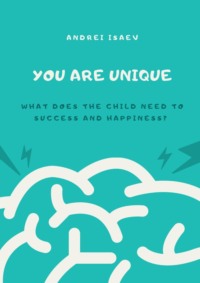Kitabı oku: «You are unique»
Translator Vasili Marshev
Translator Andrei Isaev
© Andrei Isaev, 2023
© Vasili Marshev, translation, 2023
© Andrei Isaev, translation, 2023
ISBN 978-5-0051-4823-0
Created with Ridero smart publishing system
Introduction
The development of a human, his/her personality and basic psychological processes begins in childhood.
All the important psychological features, with which a person enters the independent adult world, are acquired in one’s childhood.
It is difficult to overestimate the influence of childhood on the life of an adult.
At this age, the child is surrounded by parents, teachers, relatives – people who are directly involved in the development of the child. And the success of this development depends on them.
This book is for people who surround the child.
It will focus mainly on the children at pre-school and primary school stages.
These stages are extremely important for the development of the child. The experience gained in developmental psychology helps to resolve many issues that parents have to face raising the child at this age.
The purpose of the present is to aid parents and teachers in the development of a happy, successful person, effective in all areas of personal and social life. This development begins in childhood.
At home
One child is enough to fill the whole house and a yard.
Mark Twain
1. Why establish rules and how to do it?
The child has a sense of duty not imposed by force, tends to order, does not abandon rules and responsibilities. He/she only wishes that the burden would not be too heavy, that it would not break his/her back, that he/she would meet understanding whenever he staggers, slips, is tired, stops to catch his/her breath.
Janusz Korczak

Psychologists have noticed long ago that at the age of 6—10 years, children want to imitate their parents. Children are ready to communicate, learn skills and cooperate
At this age, it is important for children to follow established rituals and habits. It is also important for children that their parents have determined limits to regulate their desires and impulses. Children need rituals and clear rules.
Without rules supervised by parents, children learn negative habits, start back talking, react aggressively to requests.
For education to be successful, it must be organized.
Proper organization allows children to feel safe, self-confident, to feel confidence in others, which is very important for development.
Parents, when they engage in the education of a child as a team, create order. Thanks to this order, children feel calm and always know what they are allowed to do, when and how.
Establishing rules helps to organize the activities of the child, to obtain the freedom of action. Rules give the child this freedom.
If rules are missing or unclear, the child does not know how to behave. He/she can only guess.
The child, being aware of clear and understandable rules, feels respected and accepted by the adults who make the rules. Rules help to build trust between parents and the child.
Children like to follow rules, children often criticize parents for not complying with the rules. And kids are right in doing so.
It is important to understand the difference between commands and rules. The rule is a clear, predetermined order that should be always followed by everybody. The command is given by a superior to an inferior.
Rules are clear principles which are followed always and everywhere. A coercion or a command are not rules.
Therefore, prohibitions work only if they are accompanied by rules.
What makes a rule effective?
Here are some features of affective rules:
Consistency. Both parents should establish and control compliance with the rules. A rule does not last long without it.
Precision. The rule should be clear to the child. Formulate it as simply as possible.
Here are some examples of precise and imprecise rules taken from Daniele Novara’s “Do Not Yell At Children”:
Imprecise rules:
– Sit still
– Don’t play with your food
– Eat it all
– Don’t bother your brothers and sisters
– Only adults can turn on the TV
Precise rules:
+ Sit, do not stand, at the dinner-table
+ You can’t leave the table until everyone is finished.
+ The TV must be turned off
+ You can talk
+ Everyone sits in their own seats
Practicality. The child should understand how to follow a rule and be able to do it. A rule should be appropriate to the age of the child.
Feasibility. Rules must be formulated in a way they can be implemented. For example, one cannot run and not sweat. It is almost impossible for a child to play outside and not get dirty. Playing with other children without fighting is also very difficult (and does not make much sense)
Rationality. The rule should have positive educational goals. You can always ask yourself: does this rule help my child to develop?
Ücretsiz ön izlemeyi tamamladınız.
